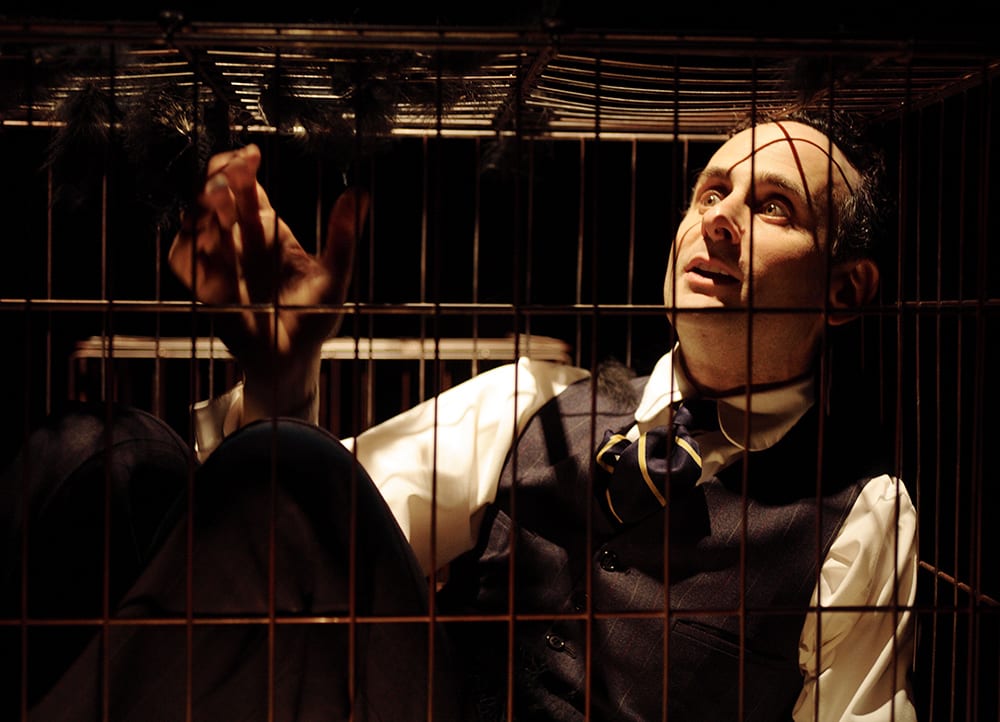In a dark theater with rusty cages, a prison cot, melodramatic music, and black feathers strewn everywhere, my first impression of Kafka and Son was that it was a bit…heavy-handed. But by the time Alon Nashman emerged on the other side of the show, having brought to life Franz Kafka’s 45-page Letter to his Father (as well as reanimating the psyche of the writer himself), I had utterly changed my mind. What seems cliché twists to conjure new images, new feelings.Relationships and struggles that seem played out find a new way to haunt and horrify.
Kafka and Son is part of the Fringe Encore Series, an initiative by the SoHo Playhouse to celebrate the best of theater from the Fringe Festivals by giving them a longer run, a venue, and an audience. This year’s Fringe Encore Series pulls from festivals all over the world, such as the Edinburgh Fringe Festival, where Kafka and Son appeared most recently.
The play’s author, narrator, and main character is Franz Kafka himself, the 20th-century writer perhaps most well-known for his book The Metamorphosis. He wrote in the German language and came from a Jewish family. He was the oldest child and the only surviving son, and was always sickly. All of these elements of his life, of course, Kafka brings against his father in his letter as an indictment of his parenting.
The notion of turning a 45-page letter full of deeply personal grievances and a painstaking breakdown of years of emotional abuse is weighty. Kafka wrote Letter to His Father in 1919, addressing and accusing his father of the traumatizing upbringing that stunted him the man. At age 36, Kafka was still living at home under the authority of that same abusive man, and dreaming of ways to free himself. With both brilliant actor and director, such daunting material naturally lends itself to a one-man show. Nashman seamlessly embodies both the timid, intellectual son and the overbearing, authoritative bully of a father. He has perfected the wide, begging eyes of Kafka searching for compassion, as well as the harsh chortle and dominant stance of Kafka’s father.
The letter, and the show, begin like this: “Dearest Father, You asked me recently why I maintain that I am afraid of you. As usual, I was unable to think of any answer to your question, partly for the very reason that I am afraid of you…” Whether it is Kafka’s poignant and eloquent words, or Nashman’s vivid interpretation, one is never really sure when to laugh and when to cry. The experience of Kafka and Son is so intense that you find yourself hanging onto every word, and every new way director Mark Cassidy has devised for the scenes to play out.
Nashman as Kafka speaks out to the audience, sometimes as if we were his Dearest Father, sometimes as if the man is somewhere beyond us, and we are only witnesses to the plea of a broken man. He narrates his childhood traumas and his adult shortcomings and, all the while, black feathers are molting from the cage that serves as his writing desk until they cover the entire floor. His smart-looking three-piece suit is peeled off and carefully buttoned back up as his vulnerabilities are revealed. And even for those with only the vaguest idea of who Kafka was, Nashman and Cassidy create powerful, haunting images with each new lamentation from the letter. We hear Kafka’s words echoing long after leaving the SoHo Playhouse.

